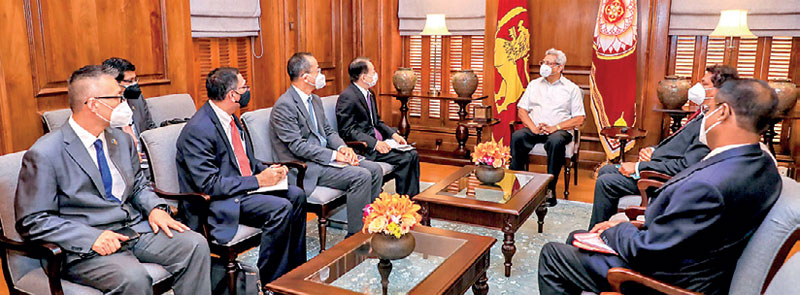Friday Feb 20, 2026
Friday Feb 20, 2026
Friday, 11 March 2022 04:30 - - {{hitsCtrl.values.hits}}

The Asian Development Bank (ADB) President Masatsugu Asakawa arrived yesterday in Sri Lanka and reaffirmed the multilateral organisation’s support for a quicker socio-economic recovery amidst challenges.
Asakawa called on President Gotabaya Rajapaksa yesterday and during the meeting reaffirmed
ADB’s support for Sri Lanka’s recovery path from the coronavirus disease (COVID-19) pandemic.
Asakawa commended the Government’s rapid vaccination drive, which has been critical to managing the spread of COVID-19 and kick-starting economic activities amid social, fiscal, and debt challenges.
“Sri Lanka is managing a number of complex challenges raised during the COVID-19 pandemic, including through necessary efforts to restore fiscal and external balances while containing inflation,” Asakawa said. “ADB is committed to supporting the Government in addressing the present challenges and striding toward green, resilient, and inclusive growth as well as sustainable energy transition.”
Asakawa is on a two-day visit to Sri Lanka, his first visit to South Asia since assuming office in January 2020. In meetings with Prime Minister Mahinda Rajapaksa and Finance Minister and Chair of the ADB Board of Governors Basil Rajapaksa, Asakawa highlighted the need to underpin sound macroeconomic management with structural reforms. ADB is preparing a new country partnership strategy for Sri Lanka to support its National Policy Framework and medium-term development targets.
Together with ADB Director General for South Asia Kenichi Yokoyama and ADB Secretary Muhammad Ehsan Khan, Asakawa reviewed preparations for the 55th Annual Meeting of the ADB Board of Governors to be hosted by Sri Lanka in September with the theme of "Positioning Climate Resilient Green Economy for the Post COVID-19 World".
During his visit, Asakawa will inaugurate Sri Lanka’s first microgrid system and the associated research and development lab at the University of Moratuwa. The system can operate in both grid-tied and off-grid modes. The pilot, financed under the ADB-assisted Supporting Electricity Supply Reliability Improvement Project, has the potential to be replicated and contribute to a green and climate resilient future.
He is scheduled to visit the Colombo Port and the Port Access Elevated Highway Project, which provides a direct link to the port from the expressway network. Colombo Port received support from ADB to improve container handling capacity and is now one of South Asia’s few deep-water ports strategically linking the key Asia–Europe shipping route. Asakawa will also visit the ADB-supported molecular polymerase chain reaction (PCR) laboratory at the Colombo East Base Hospital. The laboratory - the largest in the country - was established in 2020 to support Sri Lanka in its response against the COVID-19 pandemic.
ADB is a long-standing partner of Sri Lanka, which is a founding member of the institution. Since its first loan to Sri Lanka in 1968 to help modernise tea factories, ADB has funded projects in a variety of sectors such as agriculture, rural development, water, transport, and energy. ADB has provided cumulative assistance of $11.3 billion, including both sovereign and non-sovereign projects and programs. ADB’s Trade and Supply Chain Finance Program (TSCFP) has supported transactions valued at $ 6.9 billion, of which $ 1.26 billion was for essential goods imports in 2021 including vaccines and other medical and pharmaceutical products.
During the pandemic, ADB provided $ 150 million to support the country’s vaccination drive, and additional loan and grant funds to procure medical supplies and materials to increase the screening and testing capacity across the country, expand intensive care services, and upgrade emergency treatment units and inpatient hospital wards. TSCFP also supported import of vaccines totalling $ 160 million.
ADB is committed to achieving a prosperous, inclusive, resilient, and sustainable Asia and the Pacific, while sustaining its efforts to eradicate extreme poverty. Established in 1966, it is owned by 68 members - 49 from the region.